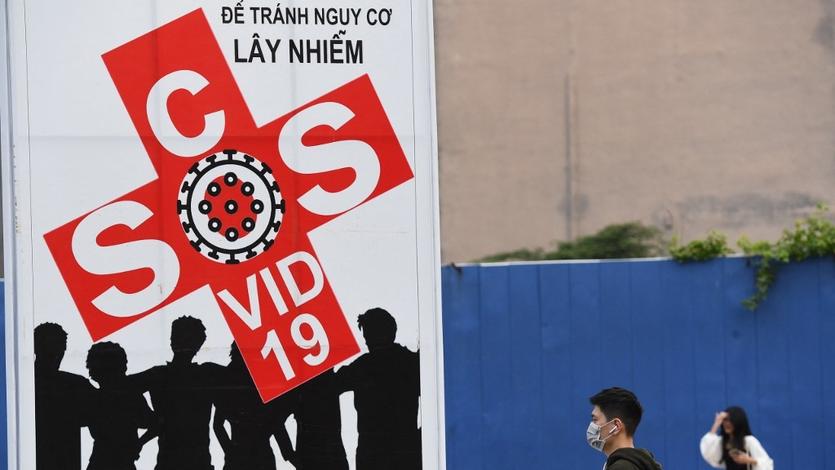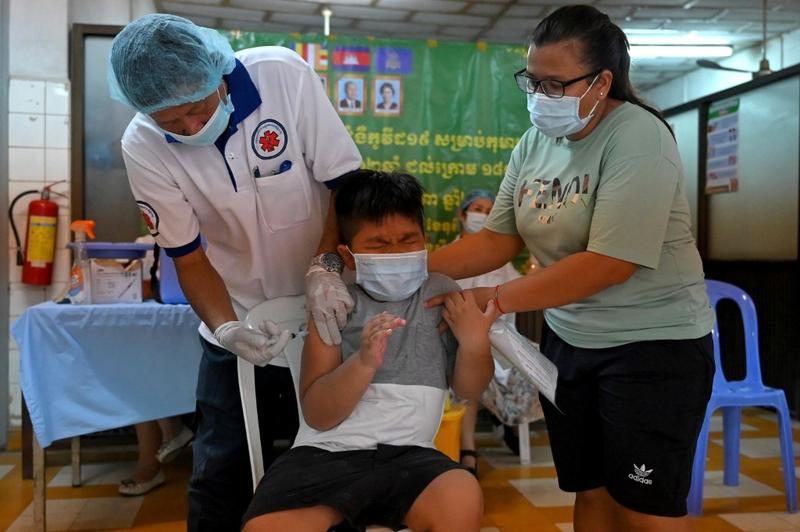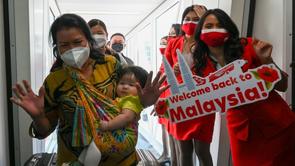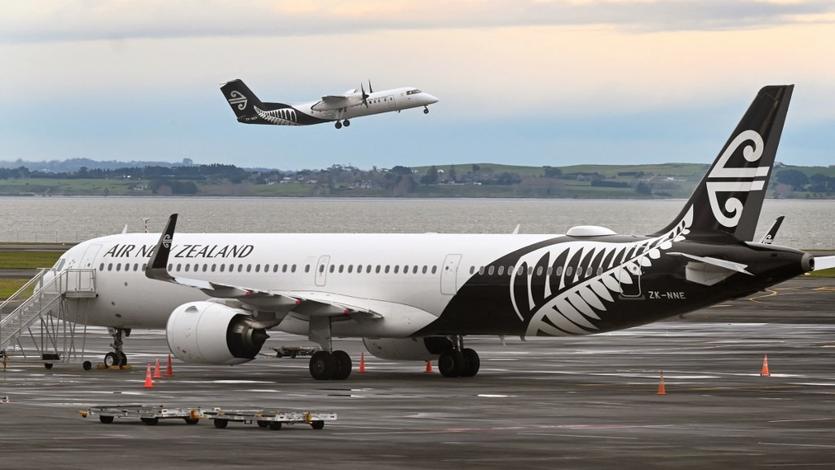 A man passes walks past a billboard on the coronavirus in Ho Chi Minh City on Dec 4, 2021. (NHAC NGUYEN / AFP)
A man passes walks past a billboard on the coronavirus in Ho Chi Minh City on Dec 4, 2021. (NHAC NGUYEN / AFP)
WELLINGTON / KUALA LUMPUR / NEW DELHI / SEOUL / HANOI / PHNOM PENH - Vietnam started its vaccination program for children aged five to 11 on Thursday, Vietnam News Agency reported.
The northern province of Quang Ninh is the first locality in the country to inoculate its children in this age group. The first batch of vaccines administered to the children is Moderna vaccines, sponsored by the Australian government.
About 150 school pupils in this age group will be inoculated on Thursday, local media Tuoi Tre reported, adding that Quang Ninh has nearly 181,200 children aged five to 11.
Vietnam has about 11.8 million children in this age group, of whom about 8.2 million have never been infected with COVID-19, the newspaper said in a report on Wednesday.
The ministry set the target to complete the vaccination campaign for children in this age group in the second quarter of this year, according to the report.
 A boy receives a dose of the Sinovac coronavirus vaccine at a health center in Phnom Penh on Nov 1, 2021, as Cambodia begins vaccinating children from aged five and older. (TANG CHHIN SOTHY / AFP)
A boy receives a dose of the Sinovac coronavirus vaccine at a health center in Phnom Penh on Nov 1, 2021, as Cambodia begins vaccinating children from aged five and older. (TANG CHHIN SOTHY / AFP)
Cambodia
Cambodia on Thursday began to celebrate the three-day traditional New Year festival after muted celebrations in the last two years due to the COVID-19 pandemic.
In his new year's greetings, Cambodian Prime Minister Samdech Techo Hun Sen said the Songkran or traditional New Year celebrations have been resumed in cities and provinces after the Southeast Asian nation has achieved strong herd immunity against COVID-19.
"For this year, the Cambodian people can fully enjoy the traditional New Year, unlike in the past two years, when we severely faced with the COVID-19 pandemic," the prime minister wrote on his official Facebook page.
Cambodia has fully resumed its socio-economic activities and reopened its borders to fully vaccinated travelers without quarantine since last November after most of its population have been vaccinated against COVID-19.
The kingdom has so far administered one dose of COVID-19 vaccines to 14.85 million people, or 92.8 percent of its 16 million population, the health ministry said, adding that of them, 14.1 million, or 88.1 percent, have been fully vaccinated with two required shots.
India
India's COVID-19 tally rose to 43,039,023 on Thursday, as 1,007 new cases were registered during the past 24 hours across the country, showed the federal health ministry's latest data.
Besides, one death from the pandemic since Wednesday morning took the total death toll to 521,737.
 A woman carries an infant upon arrival from Jakarta after landing at Kuala Lumpur International Airport 2 (KLIA 2), as Malaysia reopened its borders for travelers fully vaccinated against the coronavirus, in Sepang on April 1, 2022. (MOHD RASFAN / AFP)
A woman carries an infant upon arrival from Jakarta after landing at Kuala Lumpur International Airport 2 (KLIA 2), as Malaysia reopened its borders for travelers fully vaccinated against the coronavirus, in Sepang on April 1, 2022. (MOHD RASFAN / AFP)
Malaysia
Malaysia reported 10,052 new COVID-19 infections as of midnight Wednesday, bringing the national total to 4,352,611, according to the health ministry.
There are 21 new imported cases, with 10,031 being local transmissions, data released on the ministry's website showed.
A further 22 deaths have been reported, bringing the death toll to 35,363.
 A photo taken on Aug 9, 2021 shows an Air New Zealand plane taking off from Auckland Airport, New Zealand. (WILLIAM WEST / AFP)
A photo taken on Aug 9, 2021 shows an Air New Zealand plane taking off from Auckland Airport, New Zealand. (WILLIAM WEST / AFP)
New Zealand
Air New Zealand no longer requires proof of COVID-19 vaccination and negative test for domestic and international fights.
"As New Zealand moves through the peak of Omicron and the country's COVID-19 settings are relaxed, we will be adjusting some of our domestic and international travel requirements for customers," Air New Zealand Chief Executive Officer Greg Foran said in a statement.
From Thursday, passengers are no longer required to show proof of vaccination or negative test to fly around New Zealand, and from May 1, Air New Zealand will remove the "no jab, no fly" policy for international flights, Foran said, adding it is important to note international visitors will still need to meet the relevant government entry requirements.
The move came as New Zealand on Thursday moved down to the second highest Orange settings under its COVID-19 Protection Framework.
Under Orange there are no indoor capacity limits and the seated and separated rule for hospitality venues lifts, so bars, cafes and restaurants are able to fill up again. However, people are required to wear a face mask in many indoor settings.
From Friday, Air New Zealand will restart its food and beverage service on board, Foran said, adding masks will still be required onboard domestic and international flights.
South Korea
South Korea reported 148,443 new COVID-19 cases as of midnight Wednesday compared to 24 hours ago, raising the total number of infections to 15,979,061, the health authorities said Thursday.
The daily caseload was down from 195,419 the previous day and far lower than 224,788 a week earlier, according to the Korea Disease Control and Prevention Agency (KDCA).


